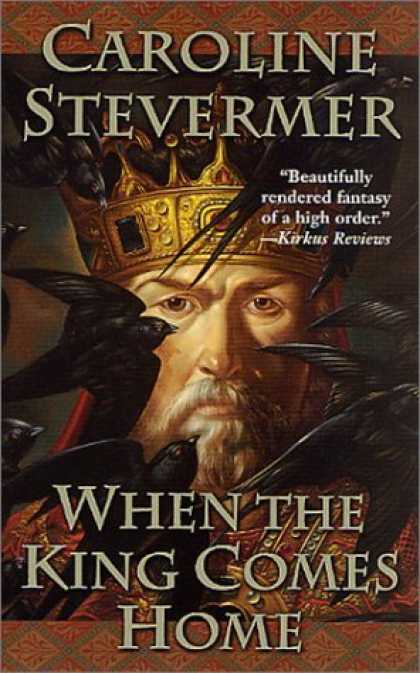Caroline Stevermer is one of the writers who unaccountably doesn’t get much attention. I don’t understand why this is—maybe because she hasn’t written a series, or maybe because some of her work is YA, though YA is popular lately. She co-wrote the Sorcery and Cecelia books with Patricia Wrede, and she’s also written a number of adult books on her own. She’s one of the astonishing crop of writers from Minneapolis—I think it must have the highest density of fantasy and SF writers per capita of any city in the world.
I was born on the coldest day of the year. When the midwife handed me to my father he said “Hail the newcomer! Hardy the traveller who ventures forth on such a day.”
After four sons, my family was pleased to have a daughter at last. My father persuaded my mother than I should be named Hail, to commemorate the welcome I’d been given. My name is a greeting, dignified and sober, not a form of bad weather.
Some books take a little while to get going, but this one grabs from the first instant.
No spoilers.
When the King Comes Home was published in 2000. It’s not a long book, 236 pages, and quite unforgettable. It’s set in the same world as A College of Magics and A Scholar of Magics, but it isn’t related to them at all. For that matter it’s set in this world, but in Lidia, an imaginary central European country. This is an unusual thing for fantasy to do these days, especially as it’s set during the Renaissance—the year isn’t specified. This is definitely our world, with Christianity, Romans, and Vienna, but with the addition of magic. There’s a librarian turned sorceress who can raise the dead and turn herself into an owl, there’s a Church wizard. There are people come back from the dead and not sure how to cope with life. It’s a serious novel with a terrific first-person protagonist. Hail is an incredibly focused painter’s apprentice in the Lidian capital, Aravis. She gets obsessed with Maspero, an artist who lived two hundred years before, and this obsession puts her right in the centre of events when they start to happen. (“If I cut your head off would I find the name Maspero inside?” one of the other characters asks in exasperation. “In letters of gold,” Hail confirms.)
We discussed how the phrase “historical fantasy” means a whole pile of different things, so I’m trying not to use it casually. We don’t really have a word for fantasy that’s at the kingdom level. Nothing is threatening the world, there’s no dark lord, no huge threat. Yet this isn’t just a story of people going about their lives. I suggested “Shakesperean fantasy,” and I suppose that’s what this is. It belongs in the same genre as Macbeth. It’s nothing like Macbeth, but it’s more like than than it is like The Lord of the Rings. There’s a lord who wants to be king, there’s an old dying king with no heir, there’s a prince-bishop, and they all have political agendas and make use of magic among other possibilities. This is a historical story that needs to be fantasy, and works because it is fantasy, but it’s focused and grounded in the details of life in the period and the way people are.
What Stevermer does brilliantly here is Hail’s voice, and the way that Hail going about her own life focused on her own concerns means she gets caught up in large events—and then the repercussions of those events for ordinary people. Hail’s a very convincing obsessed teenager—and the extra layer given by looking back on her life and writing the story as a memoir in old age is excellent too. The details of her apprenticeship—the rivalries and friendships, mixing paint, copying styles, “pouncing” patterns with charcoal, are fascinating.
This book is a gem. I like it better every time I read it.
Jo Walton is a science fiction and fantasy writer. She’s published eight novels, most recently Half a Crown and Lifelode, and two poetry collections. She reads a lot, and blogs about it here regularly. She comes from Wales but lives in Montreal where the food and books are more varied.










